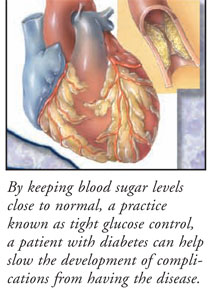
Consequences of Poor Control
Diabetes affects many organs in the body and causes complications that can be serious and irreversible. When blood sugar is not tightly controlled, the organs can suffer severe damage. By carefully controlling their blood sugar (glucose), however, people with diabetes can reduce their risk of complications. Poorly controlled blood sugar can cause long-term problems by damaging eyesight, the heart, the arteries, the kidneys, and nerve endings. The consequences of poor blood sugar control over time include blindness, foot ulcers or amputation, heart attack, stroke, angina, hypertension, kidney failure requiring dialysis, neuropathies (which can lead to loss of feeling in the arms and legs), and impotence. Knowing the best target blood sugar range can help a person with diabetes maintain tight control of blood sugar throughout the day. Keeping a record of blood sugar levels will show how well diet, oral drugs, or insulin is keeping blood sugar under control. Diabetic patients can maintain their health by getting a yearly eye exam and having blood tests to measure cholesterol levels. Also important are periodic blood tests to measure hemoglobin A1c. When blood sugar is high, changes occur in hemoglobin, which carries oxygen in the blood. Patients with diabetes should regularly check their blood pressure and examine their feet every day for any cuts, swelling, or redness.
Blood Glucose Level Must Be Controlled
From 1983 to 1993, the National Institute of Diabetes and Digestive and Kidney Diseases conducted a study known as the Diabetes Control and Complications Trial. This study was designed to determine the effect of tight glucose control (known as “intensive control”) on diabetes complications. The results were dramatic. Patients who maintained tight control of their blood sugar levels significantly reduced their chances of developing eye, kidney, and nerve diseases when compared to those on standard therapy. The results of this study show that strict blood sugar control is critical in avoiding irreversible damage to these organs over time.
Most complications develop after years of having diabetes. However, the tighter you control your blood glucose levels, the less likely it is that these complications will develop or worsen. Over time, high sugar levels cause poor blood circulation and injury to many major organs.
Loss of vision:
Diabetes is the number one cause of blindness in adults in the US. A change in the tiny blood vessels in the eye eventually leads to retinopathy (damage to the retina) in almost all insulin-dependent (type 1) diabetics and a majority of patients with type 2 diabetes. This means an annual eye exam with dilation is critical to detect early changes in the eye. The same changes that occur in the blood vessels of the eye can develop in the vessels that go to the heart.
Heart and blood vessel disease:
Diabetes greatly increases the risk of coronary artery disease. The cause of death in more than 80% of diabetic people is a heart or blood vessel disorder. Atherosclerosis, coronary artery disease, high blood pressure (hypertension), elevated levels of blood cholesterol, heart attack, and stroke are all more likely to occur in a patient with diabetes.
Kidney failure:
In the kidney, long-standing diabetes can damage the tiny blood vessels needed to filter waste, and the result can be irreversible kidney failure, which develops slowly over a period of years. Once symptoms of kidney damage appear, such as high blood pressure or swollen feet and hands, the kidneys have been seriously damaged.
Nerve damage:
Neuropathy is a type of nerve damage probably caused by high glucose concentrations in the small vessels that supply blood to the nerve endings. Neuropathy can lead to weakness of a limb and tingling, burning, or numbness in the feet, legs, even fingers and arms. Neuropathy can also cause problems with digestion of food, leading to nausea, vomiting, diarrhea, or constipation. Swallowing difficulties and acid reflux can develop.
Skin breakdown:
In diabetes, poor circulation to the skin can lead to sores and infections. Wounds heal more slowly. Ulcers and infections on the foot or leg may not heal at all, and amputation of the limb may become necessary.
Sexual dysfunction:
Impotence occurs in up to 50% of men with diabetes because of problems with circulation and nerve damage.
Other:
Susceptibility to infection (especially of skin and urinary tract) and other conditions (such as carpal tunnel syndrome) are increased in patients with diabetes.
Follow your treatment plan:
If you have diabetes, follow your doctor’s orders. To achieve tight control, self-testing glucose levels several times each day may be recommended. Keep track of your blood sugar and A1c levels to see if you are on target with your doctor’s recommendations. Remember, many of the complications of diabetes develop over a long time. These complications are serious and must be treated promptly. Even if you have had poor blood sugar control, keeping blood sugar close to normal can reduce your risk. A diet and exercise program will help improve control. If you have questions about your medications, be sure to ask your pharmacist.






